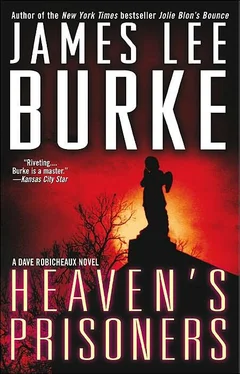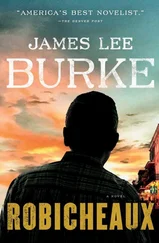"He knows I don't mean any harm. Right, chief? I don't get in people's face, I don't mess in their space. I ain't no swinging dick. You know what that is, don't you, chief?"
"Show time's over," I said.
"You telling me? I get minimum wage and tips in this place, and I don't need the hassle. Believe me, I don't need the hassle."
I watched him walk into the storage room at the back of the bar. He walked like a mainline con and full-time wiseguy, from the hips down, with no motion in the chest or arms, a guy who would break into jails or be in a case file of some kind the rest of his life. What produced them? Defective genes, growing up in a shithole, bad toilet training? Even after fourteen years with the New Orleans police department, I never had an adequate answer.
"About that Bubba Rocque stuff, that's just what I heard. I mean, it didn't come from me, okay?" she said. "Bubba's crazy, Dave. I know a girl, she tried to go independent. His guys soaked her in gasoline and set her on fire."
"You didn't tell me anything I didn't already know about Bubba. You understand that? You're not a source."
But I could still see the bright sheen of fear in her eyes.
"Listen, I've known him all my life," I said. "He still owns a home outside of Lafayette. There's nothing you could tell me about him that's new."
She let out her breath and took a drink from her glass.
"I know you were a good cop and all that bullshit," she said, "but there's a lot of stuff you guys never see. You can't. You don't live in it, Streak. You're a visitor."
"I've got to run, kiddo," I said. "We live just south of New Iberia. If you ever want to work in the boat-and-bait business, give me a call."
"Dave…"
"Yeah?"
"Come see me again, okay?"
I walked out into the dusky, neon-lit street. The music from the Dixieland and rockabilly bars was thunderous. I looked back at Robin, but her barstool was empty.
That night I rolled along the I-10 causeway over the Atchafalaya flood basin. The willows and the half-submerged dead trunks of the cypress trees were gray and silver in the moonlight. There was no breeze, and the water was still and black and dented with the moon's reflection. A half-dozen oil derricks stood out blackly against the moon, then a wind blew up from the Gulf, ruffling the willows along the far shore, and wrinkled the water's surface like skin all the way out to the causeway.
I turned off at Breaux Bridge and followed the old backroad through St. Martinville toward New Iberia. An electric floodlight shone on the white face of the eighteenth-century Catholic church where Evangeline and her lover were buried under a spreading oak. The trees that arched over the road were thick with Spanish moss, and the wind smelled of plowed earth and the young sugarcane out in the fields. But I could not get Bubba Rocque's name out of my mind.
He was among the few white kids in New Iberia who were tough and desperate enough to set pins at the bowling alley, in the years before air conditioning when the pits were 120 degrees and filled with exploding pins, crashing metal racks, cursing Negroes, and careening bowling balls that could snap a pinsetter's shinbone in half. He was the kid who wore no coat in winter, had scabs in his hair, and cracked his knuckles until they were the size of quarters. He was dirty and he smelled bad and he'd spit down a girl's collar for a nickel. He was also the subject of legends: he got laid by his aunt when he was ten; he hunted the neighborhood cats with a Benjamin pump; he tried to rape a Negro woman who worked in the high school lunch room; his father whipped him with a dog chain; he set fire to his clapboard house, which was located between the scrap yard and the SP tracks.
But what I remember most about him were his wide-set gray-blue eyes. They never seemed to blink, as though the lids had been surgically removed. I fought him to a draw in district Golden Gloves. You could break your hands on his face and he'd keep coming at you, the pupils of those unrelenting eyes like burnt cinders.
I needed to disengage. I wasn't a copy anymore, and my obligations were elsewhere. If Bubba Rocque's people were involved with the plane crash, a bad moon was on the rise and I didn't want anything more to do with it. Let the feds and the lowlifes jerk each other around. I was out of it.
When I got home the house was dark under the pecan trees, except for the glow of the television set in the front room. I opened the screen door and saw Annie asleep on a pallet in front of the television, the wood-bladed fan overhead blowing the curls on the back of her neck. Two empty ice cream bowls streaked with strawberry juice were beside her. Then in the corner I saw Alafair, wearing my blue-denim shirt like pajamas, her frightened face fixed on the television screen. A documentary about World War II showed a column of GIs marching along a dirt road outside of a bombed-out Italian town. They wore their pots at an angle, cigarettes dangled from their grinning mouths, a BAR man had a puppy buttoned up in his field jacket. But to Alafair these were not the liberators of Western Europe. Her thin body trembled under my hands when I picked her up.
" Vienen los soldados aqui ?" she said, her face a terrible question mark.
She had other questions for us, too, ones not easily resolved by Annie's and my poor Spanish, or more importantly our adult unwillingness to force the stark realisation of mortality upon a bewildered child. Perhaps in her sleep she still felt her mother's hands on her thighs, raising her up into the wobbling bubble of air inside the plane's cabin; maybe she thought I was more than human, that I could resurrect the dead from water, anoint them with my hand, and make them walk from the dark world of sleep into the waking day. Alafair's eyes searched mine as though she would see in them the reflected image of her mother. But try as we might, neither Annie nor I could use the word muerto .
" Adónde ha ido mi mamá ?" she said again the next morning.
And maybe her question implied the best answer we could give her. She didn't ask what had happened to her mother; she asked instead where she had gone. So we drove her to St. Peter's Church in New Iberia. I suppose one might say that my attempt at resolution was facile. But I believe that ritual and metaphor exist for a reason. Words have no governance over either birth or death, and they never make the latter more acceptable, no matter how many times its inevitability is explained to us. We each held her hand and walked her up the aisle of the empty church to the scrolled metal stand of burning candles that stood before statues of Mary, Joseph, and the infant Jesus.
" Ta maman est avec Jésus ," I said to her in French. " Au ciel."
Her face was round, and her eyes blinked at me.
" Cielo ?" she asked.
"Yes, in the sky. Au ciel ," I said.
" En el cielo ," Annie said. "In heaven."
Alafair's face was perplexed as she at first looked back and forth between us, then I saw her lips purse and her eyes start to water.
"Hey, hey, little guy," I said, and picked her up on my hip. "Come on, I want you to light a candle. Pour ta maman ."
I lit the punk on a burning candle, put it in her hand, and helped her touch it to a dead wick inside a red glass candle container. She watched the teardrop of fire rise off the wax, then I moved her hand and the lighted punk to another wick and then another.
Her moist eyes were bright with the red and blue glow from inside the rows of glass containers on the stand. Her legs were spread on my hip like a frog's, her arms, tight around my neck. The top of her head felt hot under my cheek. Annie reached out and stroked her back with the flat of her hand.
Читать дальше












